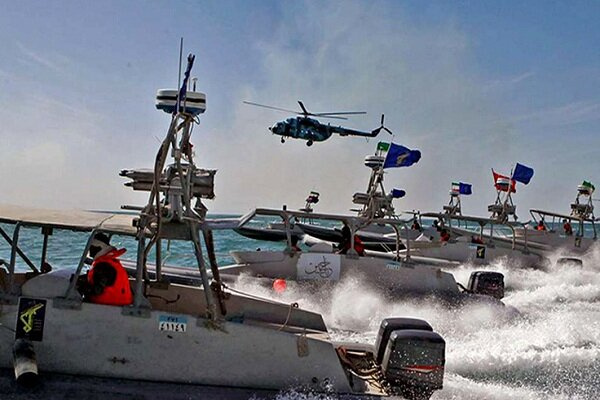Significance of IRGC comdr. remarks, review of Trump's bluffs and setbacks

Commander of Islamic Revolutionary Guards Corps (IRGC) Major General Hossein Salami along with IRGC Navy Commander Admiral Alireza Tangsiri and a group of deputies from the IRGC headquarter visited Naze’at region as well as Abu Musa and the Greater and Lesser Tunbs on Thursday morning.
Referring to Iran’s strategic move of launching a military satellite into space on Wednesday, Major General Salami said, “The significant message regarding the successful satellite launch is that we are determined to develop our territorial defense power on land, sea, and space. We will never stop.”
Reacting to threats by US officials such as Donald Trump who ordered US troops to attack Iranian forces if they harass US ships in the Persian Gulf, Salami noted, “We will target any US combat unit which jeopardizes our security in the Persian Gulf.”
He further referred to the recent remarks by US officials and emphasized, “We announce to Americans that we are fully committed to defending our national security, water borders, maritime interests and the safety of shipping and our forces at sea. Any action will be met with our decisive, effective, and swift response.”
Examining the history of US behavior in the region towards Iran and the Resistance Axis suggests that their threats are nothing but a bluff and psychological warfare, and whenever Americans are convinced that their ill-considered action will be responded strongly, they have tried to withdraw from their previous threats and statements. Here are just a few of their retreats over the past year:
On June 20, 2019, the IRGC aerospace force identified and destroyed a US RQ-4 Global Hawk UAV which had entered Iranian airspace. Following this move, the US threatened to target several Iranian centers. But after the White House made sure that any ill-considered action would provoke a strong reaction from Iran, US president took a humanitarian stance and claimed that no one had been killed in the Iranian attack and he did not want anyone to be killed in the US attack. Therefore, He refused to respond.
After the martyrdom of Lt. General Soleimani, Iran vowed to take strong revenge against US terrorist forces. As usual, after the Iranian threat, US officials, including the president himself, began to threaten Iran, saying that if Iran took any action against US forces, the White House would give Iran a painful and extensive military response.
However, we witnessed that the Revolutionary Guards retaliated strongly against the US terrorist forces by launching a massive missile attack on the Ain al-Assad base, and the US President, who knew that any action against Iran's retaliatory attack would have an extensive and painful response, claimed that the damage was insignificant and tried to find an excuse for not responding to Iran. The IRGC's missile strike was unprecedented since the end of World War II.
Moreover, at the end of the last Iranian Year, we witnessed extensive US military moves in Iraq and at the same time, the US media initiated large-scale psychological warfare claiming that the US is preparing to attack Iraqi Resistance and the forces close to Iran. Following the Iraqi group's decisive stance to any possible US move and the General Qaani's visit to Iraq which indicated the Resistance strong determination to respond to any hostility, We finally saw that the US withdrew from its previous threats.
We have recently seen that US president and a number of US officials have threatened Iran again. Trump has ordered US troops to shoot down Iranian forces if they harass US ships in the Persian Gulf. The visit of the Commander of Islamic Revolutionary Guards Corps of the triple Islands and his warning to US officials that Iran will not hesitate to defend its interests and territorial integrity can be assessed in this regard. He is trying to show US empty threats and their inability in the region by visiting these Islands.
And as usual again a day after the US president's threat the pentagon officials tried to water down his remarks. A day after his threat the Foreign Policy wrote following Trump's twitter message the Pentagon's officials were surprised and sought to manage up, downgrading Trump's remarks to a warning.
" What he [Trump] was emphasizing is all of our ships retain the right of self-defense, and people need to be very careful," said David Norqoist, US Deputy Secretary of Defense.

